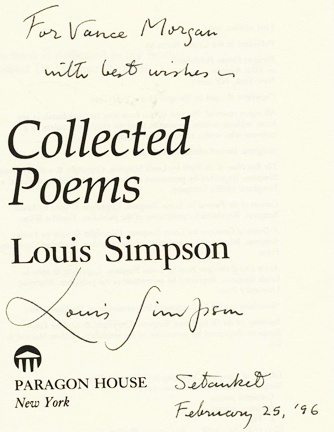Wislawa Szymborska, winner of the 1996 Nobel Prize in Literature, said poetry is something only two in a thousand people really care about. It may have been the poet’s invented statistic, but it doesn’t sound far off the mark. When was the last time, after all, you saw someone in the cafe invested in a collection of verse? A poetic debut tends not to generate the same buzz as a novel or new biography. What gives? Why has the preferred mode of Homer, Dante, and Shakespeare come to be so...neglected?
 The issue is rather complex. Of course, there are still people who love—really love—poetry, and they will never go away (and thank goodness for that). But poetry’s neglect isn’t a mere problem of lazy or ignorant readers. Writers have changed, too. The major, indispensable writers of recent times have not exactly been poets. Those authors of the last century who have the best chance at posterity have preferred the novel and drama to poetry. In Search of Lost Time and Waiting for Godot will likely have an easier time finding an audience in one hundred years than will Yeat’s or Elizabeth Bishop’s verse.
The issue is rather complex. Of course, there are still people who love—really love—poetry, and they will never go away (and thank goodness for that). But poetry’s neglect isn’t a mere problem of lazy or ignorant readers. Writers have changed, too. The major, indispensable writers of recent times have not exactly been poets. Those authors of the last century who have the best chance at posterity have preferred the novel and drama to poetry. In Search of Lost Time and Waiting for Godot will likely have an easier time finding an audience in one hundred years than will Yeat’s or Elizabeth Bishop’s verse.
One of the major obstacles to modern poetry’s wider appeal is the impression that it occupies a flat landscape. Mainly, that it is often difficult, opaque, and takes a small delight in confusing its readers. Such an impression is the kind that we hold complacently and quietly, although we know on some level it is probably false. There is a good deal of variety in the poetry of our time. We have the challenging verse of Paul Muldoon, the sensual language of Robin Robertson, the aphoristic glory of Wislawa Szymborska, the audacity of Frederick Seidel, and the silliness of Stevie Smith. Belonging as well to these talented writers is the distinct poetic voice of Louis Simpson.
He does not pose the intellectual challenges of Emily Dickinson or Hart Crane. Rather, Simpson offers the lean, meditative insight that verse lends itself so well to. He may have outlined his approach best himself, when he said: "I write about feelings people share, in language that can be understood." Now who could object to that?
Louis Simpson, who passed away in 2012, approached poetry with the resolve of a natural outsider. His own genealogical history was unraveled slowly to him. America may have been the land of his upbringing and maturation, but he was born in Jamaica to parents of varying backgrounds. Only when he was an adult did discover that his Scottish father had African ancestry, and that his mother endured destitution and poverty when growing up in Russia.
Being born into a family of secrets, Simpson was always trying to unravel the mystery of things, the nature of where he came from, and the America which he called home. In one poem, he gives a pithy description of the national character:
It’s complicated, being an American,
Having the money and the bad conscience, both at the same time.
Perhaps, after all, this is not the right subject for a poem.
 A formative experience for Simpson was his service in World War II, where his time in battle left him with a formidable case of PTSD. His violent impulses and traumatic memories were something that took years to control. Simpson took from his experience a sense of traumatic abandonment. The verses below come from the poem “Carentan, O Carentan,” named after a bloody battle he participated in:
A formative experience for Simpson was his service in World War II, where his time in battle left him with a formidable case of PTSD. His violent impulses and traumatic memories were something that took years to control. Simpson took from his experience a sense of traumatic abandonment. The verses below come from the poem “Carentan, O Carentan,” named after a bloody battle he participated in:
Tell me, Master-Sergeant,
O Captain, show us quickly
The way to turn and shoot.
But the Sergeant’s silent
That taught me how to do it.Our place upon the map.
But the Captain’s sickly
And taking a long nap.
The theme of alienation is far from unusual to a poet, and Simpson was no different. As Seamus Heaney said about him: “His poems win us first by their drama, their ways of voicing our ways – of making do with our lives. Then his intelligence cajoles us to the brink of a cliff of solitude and we step over into the buoyant element of true poetry."
But Simpson was also interested in helping us to conceive of ourselves and our spirit. He wrote a poem to describe the spirit of American poetry,
Whatever it is, it must have
A stomach that can digest
Rubber, coal, uranium, moons, poems.
Like the shark it contains a shoe.
It must swim for miles through the desert
Uttering cries that are almost human.
Though he is no longer with us, Louis Simpson's poetry lives on, and is as restless and as vital as ever before.









